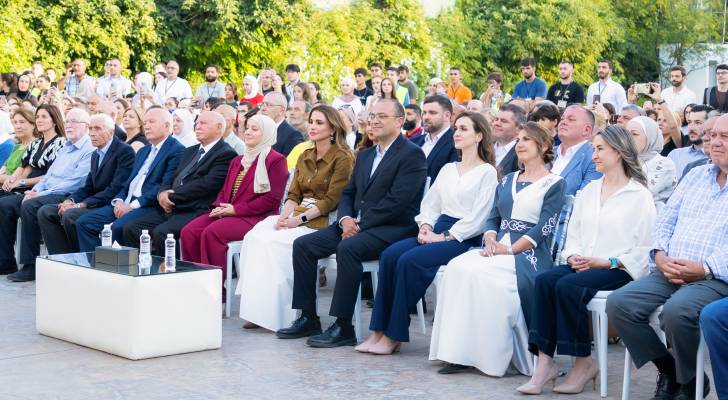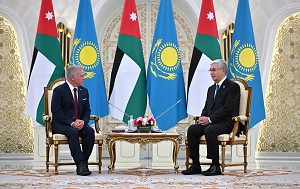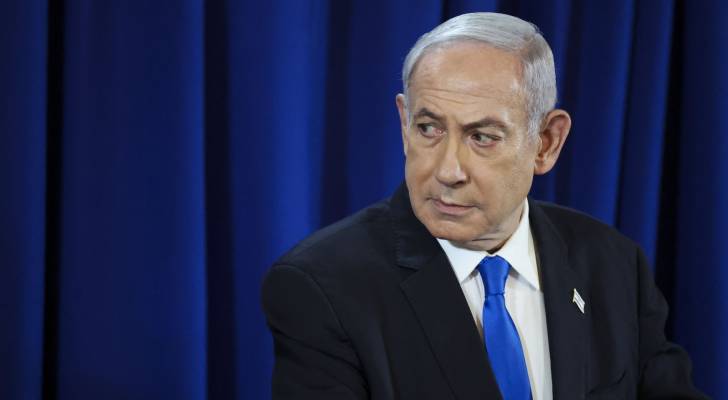EMV second executive programme sessions begin with focus on tourism, energy, water, investment
The Jordan Times
AMMAN — Ministers, lawmakers, experts and private sector representatives participated in the specialised sessions the government launched on Saturday to advance preparations for the second executive programme of the Economic Modernisation Vision (EMV).
The meetings followed workshops hosted in July by the Royal Hashemite Court that reviewed progress on the first phase of the vision (2023–2025).
Minister of State for Economic Affairs Muhannad Shehadeh said at the launching of the sessions that the second executive programme of the EMV aims to drive inclusive growth by boosting employment and GDP.
Shahadeh noted that the government would implement integrated strategic projects across multiple sectors in partnership with the private sector. The program will focus on enhancing Jordan’s regional competitiveness and creating new job opportunities while improving citizens’ income and wellbeing.
Plans also include updating economic legislation to better support private sector growth and establishing an integrated investment methodology covering opportunities both inside and outside Jordan, Shahadeh added. He also stressed the importance of practical facilitation for investors, developed in coordination with the private sector to ensure a supportive business environment.
Investment Minister Tareq Abu Ghazaleh underscored the need to assess the economic impact of projects to ensure balanced sectoral growth, sustainable job creation, and alignment with government initiatives.
He added that infrastructure development, streamlined procedures, transparent information, and public-private partnerships would strengthen Jordan’s position as a regional investment hub.
Four sessions were held on Saturday, focusing on tourism, energy, water, and investment sectors.
Tourism
Participants highlighted tourism as a major growth driver, noting Jordan’s rich and diverse offerings, from historical sites like Petra and Jerash to emerging eco-tourism and adventure destinations. Strategic goals include extending visitor stays, diversifying tourism products beyond traditional cultural offerings, and increasing international promotion campaigns.
Flagship initiatives under review include expanding infrastructure at priority sites, developing digital tourism services, and strengthening public-private partnerships to improve hospitality standards. Officials also stressed the importance of integrating local communities into the tourism value chain to create jobs while ensuring cultural and environmental sustainability.
Energy
Participants highlighted Jordan’s robust energy infrastructure, skilled workforce, and strategic location as key competitive advantages, positioning the Kingdom as a potential regional energy hub. Abundant solar and wind resources, combined with expanding policies and projects, are driving greater energy independence and a more sustainable, efficient power system.
Key objectives include developing a modern, resilient energy network, enhancing the smart capabilities of the national grid, exporting electricity to regional markets, and establishing a comprehensive natural gas distribution system for industrial zones. Flagship initiatives under the EMV feature a national energy transition roadmap focusing on renewables, electrification, grid upgrades, and regional interconnections. Regulatory reforms have also been introduced to lower costs, attract investment, and modernise the legal framework, including support for hydrogen production and use.
The first phase of EMV achieved notable milestones: in 2024, renewable energy accounted for 27 per cent of electricity generation; the initial electrical interconnection with Iraq supplied 40 megawatts of power; smart meters were installed for 84 per cent of subscribers; and time-of-use electricity tariffs were implemented. The ongoing development of the Risha gas field, alongside 24 new projects, including green hydrogen, liquefied petroleum gas infrastructure, renewable energy systems, and smart grid enhancements, further strengthens energy security, boosts industrial competitiveness, and creates employment opportunities.
Water
Water scarcity remains one of Jordan’s most pressing challenges, with participants stressing the need for innovative solutions, efficient resource management, and stronger regional cooperation. Strategic priorities discussed during the sessions include advancing national desalination projects, expanding wastewater treatment and reuse, and reducing losses in the national water network, which currently reach 47 per cent, by 2 per cent annually.
Major initiatives under consideration include the implementation of the National Water Carrier project, the development of public-private partnerships in water infrastructure, and the wider use of smart technologies for monitoring and conservation. Officials noted that agriculture consumes more than half of the Kingdom’s available water resources, while households account for nearly 46 per cent, highlighting the need for demand management alongside supply-side solutions.
The discussions also emphasised the importance of enhancing regional water-sharing agreements and creating investment opportunities for the private sector in the water sector. Energy efficiency improvements, increased use of alternative energy sources, and the integration of water storage with energy storage solutions were identified as key measures to ensure sustainable water resources for the Kingdom amid growing population and demographic pressures.
Investment
Participants reaffirmed investment as a central driver of EMV, focusing on attracting local and foreign capital through a more competitive business environment. Key priorities include simplifying procedures, enhancing transparency, and offering sector-specific incentives to support innovation and high-value industries.
Initiatives highlighted include the launch of integrated investment service centres, digitalisation of licensing and registration processes, and promotional campaigns targeting strategic partners. The session also stressed the importance of expanding industrial zones, supporting start-ups, and strengthening access to regional and international markets.




